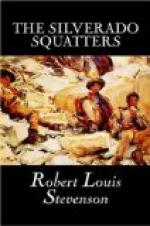And there was yet another. Upon him I came suddenly, as he was calmly entering my cottage, his mind quite evidently bent on plunder: a man of about fifty, filthy, ragged, roguish, with a chimney-pot hat and a tail coat, and a pursing of his mouth that might have been envied by an elder of the kirk. He had just such a face as I have seen a dozen times behind the plate.
“Hullo, sir!” I cried. “Where are you going?”
He turned round without a quiver.
“You’re a Scotchman, sir?” he said gravely. “So am I; I come from Aberdeen. This is my card,” presenting me with a piece of pasteboard which he had raked out of some gutter in the period of the rains. “I was just examining this palm,” he continued, indicating the misbegotten plant before our door, “which is the largest spAcimen I have yet observed in Califoarnia.”
There were four or five larger within sight. But where was the use of argument? He produced a tape-line, made me help him to measure the tree at the level of the ground, and entered the figures in a large and filthy pocket-book, all with the gravity of Solomon. He then thanked me profusely, remarking that such little services were due between countrymen; shook hands with me, “for add lang syne,” as he said; and took himself solemnly away, radiating dirt and humbug as he went.
A month or two after this encounter of mine, there came a Scot to Sacramento—perhaps from Aberdeen. Anyway, there never was any one more Scotch in this wide world. He could sing and dance, and drink, I presume; and he played the pipes with vigour and success. All the Scotch in Sacramento became infatuated with him, and spent their spare time and money, driving him about in an open cab, between drinks, while he blew himself scarlet at the pipes. This is a very sad story. After he had borrowed money from every one, he and his pipes suddenly disappeared from Sacramento, and when I last heard, the police were looking for him.
I cannot say how this story amused me, when I felt myself so thoroughly ripe on both sides to be duped in the same way.
It is at least a curious thing, to conclude, that the races which wander widest, Jews and Scotch, should be the most clannish in the world. But perhaps these two are cause and effect: “For ye were strangers in the land of Egypt.”
PART II—WITH THE CHILDREN OF ISRAEL
CHAPTER I.—TO INTRODUCE MR. KELMAR
One thing in this new country very particularly strikes a stranger, and that is the number of antiquities. Already there have been many cycles of population succeeding each other, and passing away and leaving behind them relics. These, standing on into changed times, strike the imagination as forcibly as any pyramid or feudal tower. The towns, like the vineyards, are experimentally founded: they grow great and prosper by passing occasions; and when the lode comes to an end, and the miners move elsewhere, the town remains behind them, like Palmyra in the desert. I suppose there are, in no country in the world, so many deserted towns as here in California.




